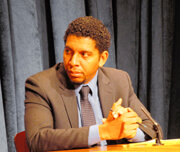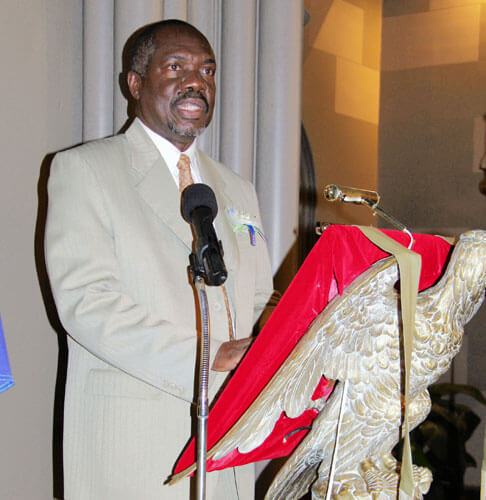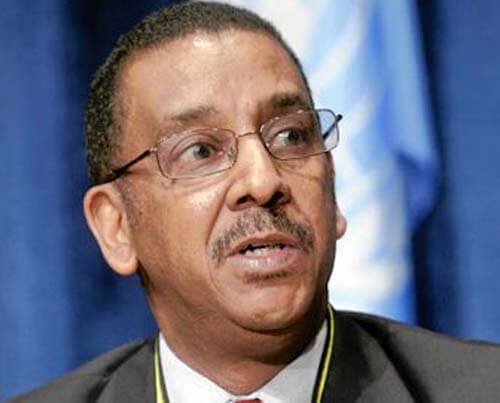St. Vincent and the Grenadines has lamented what it regards as the “initial indifference, paternalism and outright antipathy” towards Small Island Developing States (SIDS), saying that they “continue to lurk beneath the thin veneer of diplomatic formalities.”
In addressing the United Nations Third International Conference on Small Island Developing States in Apia, Samoa on Tuesday, Foreign Affairs Minister Camillo Gonsalves said the “erroneous view that Small Island States should be observers, and not participants, in important matters of international relations is self-evident in our underrepresentation or outright exclusion from the inner sancta of decision-making bodies on international security, economic cooperation, development finance or sustainable development.
“It is evident here today, in the deeply disappointing absence of high-level representation from many large and developed nations,” he said, adding that the absence of “high-level representation” has “largely left us to talk among ourselves, to preach to the choir, at what is a vitally important international conference.”
Gonsalves said these “slights beg the question of whether some powerful states would prefer that we subsist as full members of the U.N. in name only, enjoying the legal fiction of sovereign equality, while remaining observers to a geopolitical drama in which we can neither meaningfully act nor contribute to scripting the outcomes.”
He, however, urged participating countries to “reject those jaundiced perspectives and state with clarity and confidence that our time is now.
“Not for an episodic, once-per-decade engagement, but for a sustained and sincere restructuring of an outmoded one-size-fits-all approach that serves to diminish our nobility and retard our developmental aspirations,” he said.
The Vincentian foreign minister also called for an immediate end to what he described as “the practice of using per capita GDP (Gross Domestic Product) as an obstacle to any form of developmental assistance or relief to Small Island Developing States.”
“Stripped of context, per capita GDP fails to capture the obvious vulnerabilities and developmental hurdles that confront us on a daily basis,” he said, adding that “any serious analysis of our economic and developmental health must include structured evaluations of our vulnerability and resilience.
“It is only then that a truer picture of our needs and possibilities can emerge,” Gonsalves continued. “The time for such a reform is now.”
Similarly, he said the related realities of existing debt burdens require “urgent corrective attention.”
Gonsalves said SIDS’ developmental aspirations and manoeuvres are “straight-jacketed by an acute absence of fiscal space.”
“How can we address myriad climate challenges, the transition to modern modes of production, the adoption of renewable energy, the strengthening of our social safety nets, or the equipping of our citizens to meet tomorrow’s challenges, while managing a debt burden that is among the highest in the world?” he asked.
“Debt forgiveness, debt for climate swaps, and debt relief based on the magnitude of exogenous shocks are unavoidable elements of any serious SIDS-centred development discussion,” he added.
Gonsalves said the “myopic refusal of international financial institutions and their funders to squarely confront SIDS’ debt burdens can only yield disastrous consequences.”
He said SIDS’ steady developmental progress will be halted and reversed unless there is international cooperation to “lighten the Sisyphean boulder of debt that we have been condemned to push ever uphill.”
“Debt restructuring – not structural adjustment – is the urgent requirement of SIDS’ economies in the wake of the global financial crisis,” he said. “The time for such restructuring is now.”
Gonsalves said while Caribbean SIDS have, by and large, been experiencing anaemic post-crisis growth, their GDPs have been “battered with regularity and ferocity by the impacts of climate change.”
Over the last four years, he noted that St. Vincent and the Grenadines experienced “four distinct climate anomalies – from flood to drought to hurricane”, stating that each produced, on average, “double-digit hits” to the country’s GDP.
He said, last Christmas, three hours of unseasonable flooding caused loss and damage amounting to 17 percent of St. Vincent and the Grenadines’ GDP.
“We are, frankly, tired of telling major emitters that climate change is an urgent problem – an existential problem, the defining challenge of our times,” Gonsalves said.
“We are tired because the response to our alarms has been hollow promises, crocodile tears and studied indifference to the root causes of our distress,” he added.
To date, Gonsalves said the response of major emitters amounts to a “reckless and almost criminal disregard of the consequences and obligations of their actions.
“Their continuing refusal to meaningfully mitigate their emissions constitutes an act of aggression and climate warfare against Small Island States and our populations,” he declared.
The foreign minister said while SIDS this year call for “real and substantial commitments of climate financing for mitigation and adaptation,” next year they “demand and expect firm and legally binding commitments to emissions targets that will ensure our continued existence.”
He said SIDS have “neither the time nor the patience to be further insulted and endangered by excuses or inaction.
“The time to conclude our global dithering on climate change is now,” he asserted, alluding to the conference’s theme on partnerships and adding that the theme “implicitly recognises that many of the challenges facing SIDS exist beyond our borders, and that the solutions to these challenges require transnational and multi-stakeholder cooperation.”
But the minister said the word “partnerships” does not, and cannot, replace words like “commitments” and “obligations,” stating that developed partners that have made repeated commitments to development assistance targets “cannot extricate themselves from those obligations by talismanic incantations of the word ‘partnership.’”


























